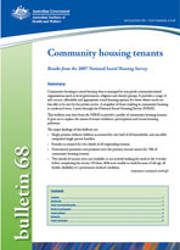Summary
Community housing is rental housing that is managed by non-profit community-based organisations such as local government, religious and charity groups. It provides a range of safe, secure, affordable and appropriate rental housing options for those whose needs are less able to be met by the private sector. A snapshot of those residing in community housing is conducted every 2 years through the National Social Housing Survey (NSHS).
This bulletin uses data from the NSHS to provide a profile of community housing tenants. It goes on to explore the issues of tenant workforce participation and tenant housing pathways.
The major findings of this bulletin are:
- Single persons without children accounted for over half of all households, and one-fifth comprised single-parent families.
- Females accounted for two-thirds of all responding tenants.
- Government payments and pensions were the primary income source for 78% of community housing tenants.
- Two-thirds of tenants were not available or not actively looking for work in the 4 weeks before completing the survey. Of these, 80% were unable to work because of old age, ill health, disability or a permanent medical condition.
- Only 26% of tenants worked full or part time. Of the tenants who were underemployed, the strongest influence on underemployment was the need for training, education or work experience.
- Nearly half (43%) of all tenants had been a tenant of their current community housing organisation for more than 5 years.
- Older tenants were more likely to come from private rental homes, whilst younger tenants tended to have previously lived with relatives or friends.
- Tenants who were previously homeless or in private boarding houses were more likely to have shorter tenures, whilst ex-public housing tenants were most likely to have been with their current community housing organisation for more than 10 years.
- The majority (86%) of tenants in boarding or rooming houses had been there for more than 6 months, of which a third have lived there for more than 5 years.
- The main benefits of living in community housing were reported by tenants as: feeling more settled; better able to manage money; and being able to keep living in the same area.



